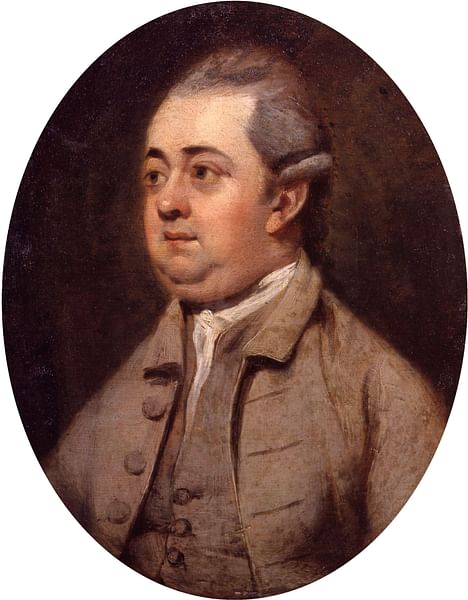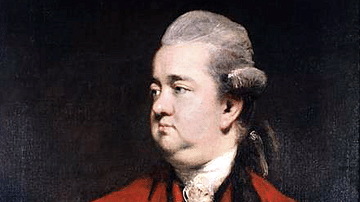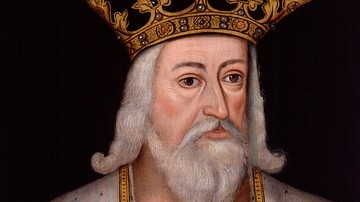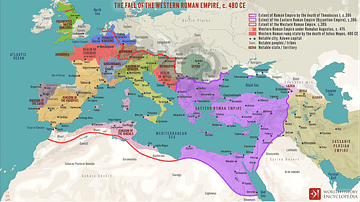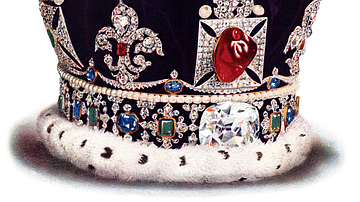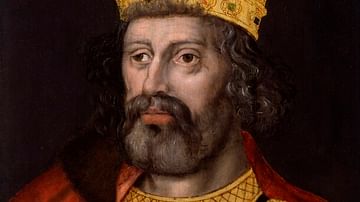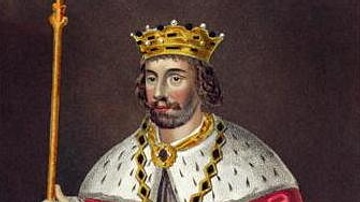The English historian Edward Gibbon (1737-1794) wrote and published his seminal work History of the Decline and Fall of the Roman Empire between 1776 and 1788. The dominant theme of Gibbon's six-volume work is that the fall of the Roman Empire was due to the rise of Christianity with its negative effects on the people and politics of Rome.
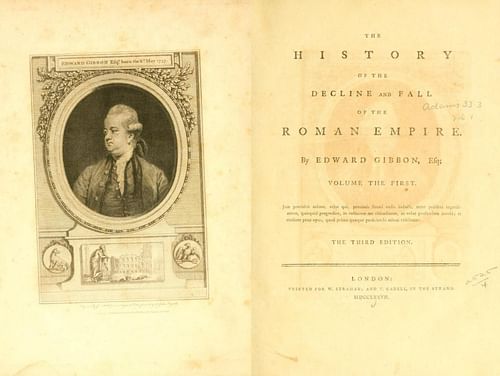
Edward Gibbon
The future historian Edward Gibbon was born in 1737 in England. His father, also named Edward Gibbon, was educated at Emmanuel College, Cambridge, and served in the House of Commons. Gibbon's mother, Judith, died in 1747. Neglected by both parents, he was raised by an aunt who instilled in him a love of reading. After being educated by a series of tutors, in January of 1748, he entered Westminster College. However, he was forced to leave after only two years due to illness. Eventually, he recovered and entered Magdalen College, Oxford, in 1752 as a Gentleman Commoner. Described as having a degree of ignorance and a stock of erudition, Gibbon saw the school as a university indifferent to its academic mission and sunk in port and prejudice.
Concerned about the quality of his son's education, the elder Gibbon removed him from Oxford and sent him to Lausanne in Switzerland to study under the Calvinistic minister M. Daniel Pavillidad. Gibbon's father had become worried when the young, indolent Gibbon had fallen under the influence of Roman Catholicism. At that time statutes remained in full force against Roman Catholics. At Lausanne, Gibbon returned to Protestantism and embarked on a path of reading classical and 'modern' literature. He became acquainted with the French philosopher and author of Candide Voltaire, who was living in exile from France for his political views. A frequent guest at Voltaire's parties and theatrical performances, Gibbon admired Voltaire for his embodiment of literary celebrity.
Returning to England in 1759, he served alongside his father with the South Hampshire militia. At that time, the young author began to publish – most of his writings were in French – on a variety of topics. With the blessings of his father, Gibbon again left England for Paris in January of 1763, and as a 'man of letters', he began to associate with the major philosophes of the city – Helvetius and d'Holbach. Returning to Lausanne, he became reacquainted with Voltaire.
Then, he travelled to Italy, visiting Florence, Rome, Naples, and Venice. It was during this time that he first considered writing on the fall of the Roman Empire. The tour had a significant impact on the young author and he wrote to his father that he became an enemy of empires as a political form but a friend to the freedom of nations. In 1768, he left Continental Europe and returned to England, where he continued to serve in the militia as well as the House of Commons. During a meeting with the Scottish philosopher David Hume, he was encouraged to write his history but to write it in English, not French.
Publication
Gibbon's multi-volume history consisted of three separate sections:
- Roman Emperor Trajan (r. 98-117 CE) to the fall of the Western Roman Empire
- Byzantine Emperor Justinian I (r. 527-565) to Holy Roman Emperor Charlemagne (r. 800-814)
- 9th century to 1453: the fall of Constantinople.
In February of 1776, the first volume of the Decline and Fall of the Roman Empire was published; it was received well. Future editions came later in June of 1776, 1777, and 1781. Of course, public attacks soon followed. According to David Womersley, editor of Penguin History, Gibbon had managed "to displease all stripes of religious opinions from High Church dogmatists to dissenters" (xix). He was criticized for both restating familiar arguments that had been levelled by infidels against Christianity since late antiquity and manipulating the historical record.
The second and third volumes were received with less enthusiasm than the first. As an accomplished author, Gibbon decided to return to Lausanne, coincidentally about the time of the French Revolution; he was moderately encouraged by the events in France but as the revolution progressed, he became discouraged by its violent character. Returning to England, the historian died on January 16, 1794.
To many of his contemporaries, he was the "English Voltaire." This was a reference to his hostility towards Christianity and his philosophic history – a type of history that was more secular, less heroic, and less dependent on divine providence. According to Norman F. Cantor in his book Antiquity, Gibbon wrote a book that has caused historians to puzzle over the causes of the decline of Roman antiquity. Cantor said that, as claimed by Gibbon, it was an internal decline as well as an assault from the outside, namely the barbarians.
Dominant Themes
Gibbon believed the Romans were ignorant of the oncoming danger and the number of their enemies. He understood the external threat from the barbarians and wrote "Cold, poverty, and a life of danger and fatigue fortify the strength and courage of Barbarians" (440). He added that Christianity "opened the gates of heaven" to the barbarians and introduced an important change in their moral and political condition.
The story of its ruin is simple and obvious, and instead of inquiring why the Roman empire was destroyed, we should rather be surprised that it had had subsisted so long. (436)
Gibbon wrote that the rise of Rome, the city, "swelled into an empire" and its decline "was the natural and inevitable effect of 'immoderate greatness'" (435). He added that "prosperity ripened the principle of decay; the cause of distraction multiplied with the extent of conquest" (435). To counter this claim, historians point to the survival of the Eastern Roman Empire, while it was only the Western Roman Empire that fell. The empire in the East and the founding of Constantinople contributed to its own preservation rather than being the ruin of the West. The decay of Rome had nothing to do with the rise of the East – the powers of government were divided rather than removed.
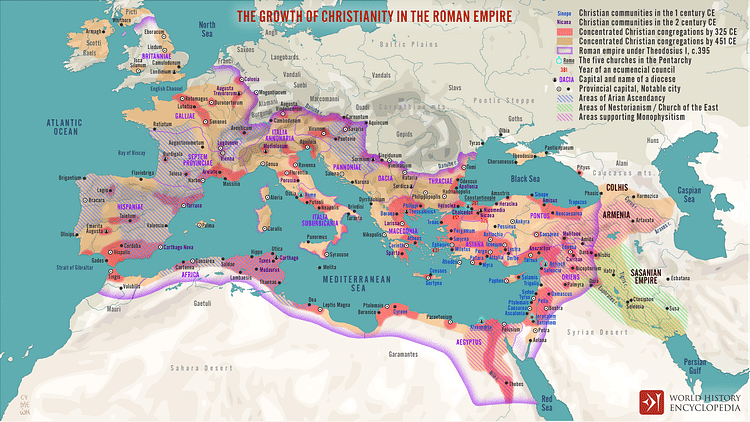
Central to Gibbon's analysis of the empire's fall was, of course, religion. He wrote:
A candid but rational inquiry into the progress and establishment of Christianity may be considered as a very essential part of the history of the Roman empire. While the great body was invaded by open violence, or undermined by slow decay, a pure and humble religion gently insinuated itself into the minds of men ... (121)
Calling Gibbon a skeptic, Cantor dismissed the "Church is to blame" claim by saying that "if the Roman society was functioning normally, the Church's culture could not have had such a major negative impact" (Cantor, 44). He added that there was a cultural cause for the decline, but it was neither the corruption of the public spirit nor Christianity. Gibbon believed the Christianization of the empire was a crucial moment because of its pacifist identity, suppressing the fighting spirit of the Roman army. He specifically points to Constantine’s Conversion to Christianity and the unleashing of a 'cultural revolution' where the ideological structure of Rome began to dismantle:
The active virtues of society were dismantled and the last remains of military spirit were buried in the cloyster. ... Faith, zeal curiosity and the more earthly passions of malice and ambition, kindled the flame of theological discord. (437)
However, according to later historians, he overstated the importance of religion in Late Antiquity. Peter Heather in his The Fall of the Roman Empire maintains that Gibbon is not convincing in his claim that Christianity had a deleterious effect on the empire. Heather believed there was no reason why Christianity should have generated such a crisis. Since the time of Augustus (r. 27 BCE to 14 CE), the presiding divinities have predicted that Rome would conquer and civilize the world. Likewise, they have inspired the emperors. Since Constantine's conversion to Christianity, the relation of the state to a deity was only surprisingly reworked. The presiding deity was now a Christian god.
Importance & Criticism
Historians have long argued over Gibbon's claims and vary widely on the long-range effects of both the history and its author. In her book Late Antiquity, Gillian Clark wrote that "Rome is the great example of the decline and fall of an empire" (6). And Gibbon made the concept very familiar. One factor that separates some historians is the effect of the time of Gibbon's writing. According to historian Mary Beard in her book SPQR, Gibbon brought about a new way of thinking about old evidence. She added that it was an "idiosyncratic historical experiment that began the modern study of Roman history in the English-speaking world" (16). She believed it was "an age when historians made judgements without hesitation and were prepared to believe that the Roman world might have been a better place to live than their own" (431).
Unlike Beard, Barry Strauss in his Ten Caesars had a more critical view of Gibbon and his window on Rome from the 18th century. Concerning Gibbon's poor assessment of Emperor Septimius Severus (r. 193-211 CE), he said that the historian was a snob, writing in the Age of Enlightenment, with little sympathy for upstarts and outsiders. However, a closer look at the Enlightenment may help one understand the origins of Gibbon's opinions. The Age of Enlightenment dominated European intellectual and philosophical thought in the 17th and 18th centuries, emphasizing the human mind and reason. It was the time of John Locke, Voltaire, Jean-Jacques Rousseau, and Montesquieu. The French philosophes, who had a major influence on Gibbon, believed the development of human reason would unleash advances in every field of human endeavor. A principal target of theirs was the Catholic Church.
However, to many historians, the time in which Gibbon wrote was crucial to both his thinking and writing. In his Pax Romana, Adrian Goldsworthy quoted a line from Decline and Fall where Gibbon alleged that the Roman Empire was "governed by absolute power under the guidance of virtue and wisdom." Goldsworthy believed this view was generous and reinforced the importance of his main theme – tracing the empire's decline and fall – and from the perspective of the 18th century not so unreasonable. He added that the Europe of Gibbon's day was divided between kingdoms great and small, competing for power and often at war, but Rome had conquered this area, "sharing the same sophisticated Greco-Roman culture" (9)
Not everything about the Empire was dreadful in Gibbon's eyes. While critical of the time previous to the empire's fall, he had high praise for the 2nd-century emperors. Both Beard and Goldsworthy quoted Gibbon's praise:
"If a man were called to fix the period in the history of the human race during which the condition of the human race was most happy and prosperous, he would, without hesitation, name that which elapsed from the death of Domitian to the accession of Commodus." (Beard, 401)
It was the time of the Pax Romana – the era of the five good emperors: Nerva, Trajan, Hadrian, Antonius Pius, and Marcus Aurelius. All of them, according to Gibbon, commanded great respect. Strauss, also quoting Gibbon, agreed and wrote that during this time the empire was at its zenith and while writing in 1776, Gibbon made a point.
Historians are united that the decline and fall of the empire in the west was due to external and internal factors:
- the decaying of the city – reduced revenue from taxes, overpopulation, poor and adequate leadership, high unemployment, and epidemics
- the influx of barbarians – although many of them were Christian.
While Gibbon does not deny these factors, he is fully alone in his blaming Christianity for the decline and fall of the empire.
